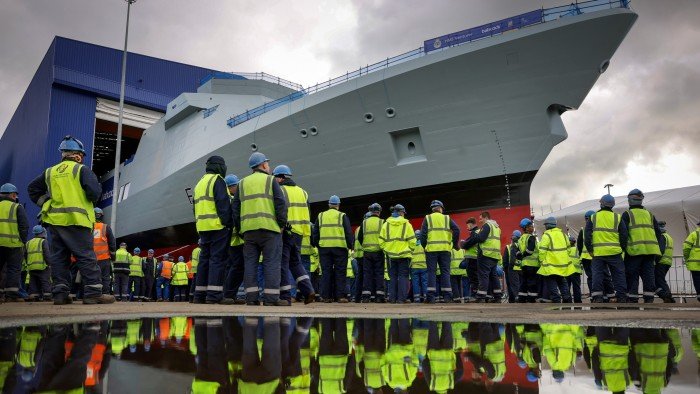Unlock the Editor’s Digest for free
Roula Khalaf, Editor of the FT, selects her favourite stories in this weekly newsletter.
Babcock International has hailed a “new era for defence” as Britain’s second-largest defence contractor raised its dividend and revenue target on the back of higher military spending amid heightened geopolitical tensions.
The FTSE 100 company, which maintains all of the Royal Navy’s nuclear submarines and builds warships such as the Type 31 frigate, also announced plans for a £200mn share buyback on Wednesday, the first in the company’s history.
Shares in the company, which had more than doubled since the start of the year, jumped almost 12 per cent in morning trading following publication of its results, valuing Babcock at £5.8bn.
The company said it was expecting average revenue growth of mid-single digits and an operating margin of at least 9 per cent in the medium term, up from at least 8 per cent previously.
“This is a new era for defence,” said David Lockwood, Babcock chief executive. There was an “increasing recognition of the need to invest in defence capability and energy security, both to safeguard populations and to drive economic growth”, he added.
The company, which re-entered the blue-chip FTSE 100 index in March after a seven-year absence, is reaping the benefits of a significant uplift in defence spending in the UK — which represented 62 per cent of group revenues last year — as well as among Nato allies.
The UK government’s recent strategic defence review prioritised investment in the country’s nuclear capabilities. Babcock’s support business will also benefit from plans to increase the country’s nuclear attack submarine fleet from seven to as many as 12 through the trilateral Aukus pact with the US and Australia.
Revenues and underlying operating profit in the year to March came in above the company’s expectations at the beginning of the year, while overall cash generation was also better than forecast. Babcock reported an 11 per cent increase in revenues to £4.8bn, with growth driven by its nuclear and marine divisions. Operating profit surged 51 per cent to £364mn.
Its contract backlog stood at £10.4bn at the end of March.
The company said it expected to hit its previous medium-term target of underlying operating margin of 8 per cent in the current financial year, at least one year earlier than expected.
